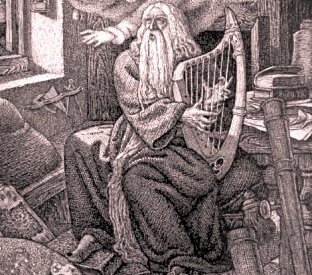
I will tell you something about stories, [he said] They aren’t just for entertainment. Don’t be fooled. They are all we have, you see, all we have to fight off illness and death. You don’t have anything if you don’t have the stories.
Like Leslie Marmon Silko in her novel Ceremony, I believe that stories are essential to our existence. Maybe not as essential as food and shelter, but they come close. This website and blog are dedicated to exploring the power of stories and the critical role that they play in our lives.
I am particularly interested in the potential of literary classics to impact our lives. A second goal of this website is to convince readers to give the classics a chance. Or a second chance if the first encounter was a bad one. I want people to think of the classics as stories, not as dusty artifacts in a museum. Works like Beowulf or Sir Gawain and the Green Knight or Doctor Faustus are a lot more accessible if you think of them as gripping stories rather than as “great literature.”
Take Beowulf, for instance, since I have named my website after this marvelous epic. When Anglo-Saxons in 8th century Mercia or Northumbria gathered to listen to this tale of warriors and monsters, they weren’t doing so in order to think of themselves as highly cultured. Nor were they academically analyzing the poem as they listened. They went because it was a good story—a story as exciting as our most exciting action adventure films, as blood curdling as our scariest horror films. Now, why they were entertained by such fare—and why we ourselves are entertained by having the wits scared out of us—are fascinating questions that I will be taking up time and again in blog postings. But the point is, they regarded the England’s first great literary work as no more (and no less) than a really good story.
What Beowulf meant for medieval warriors is in some ways very different from what it means for us today. After all, most of us do not see ourselves in imminent danger of, say, having our houses invaded at night by bloodthirsty killers. But we still may wrestle with the inner demons of deep-seated jealousy (Grendel) or out-of-control grief (Grendel’s mother) or corrosive depression (the dragon).We each of us have our own entry points into the stories we encounter.
That’s why I find readers’ accounts—what I call “reading stories”—to be almost as interesting as the stories themselves. I have been teaching the works featured in this website for close to 30 years, and the old stories never get old because each individual student has his or her own individual experience with the work. There may be generational patterns to student responses but they never repeat each other exactly.
And that leads to a third reason for setting up this website. I would like it to become a collection point for different reading stories. I hope that you, dear reader, will share your own reading stories about your own favorite books (which don’t have to include Beowulf). E-mail me with them at rrbates at smcm.edu. You will certainly hear a lot about my own reading experiences and those of my students. The more we hear about the excitement of other readers about the great stories of the past, the more those stories come alive once more.